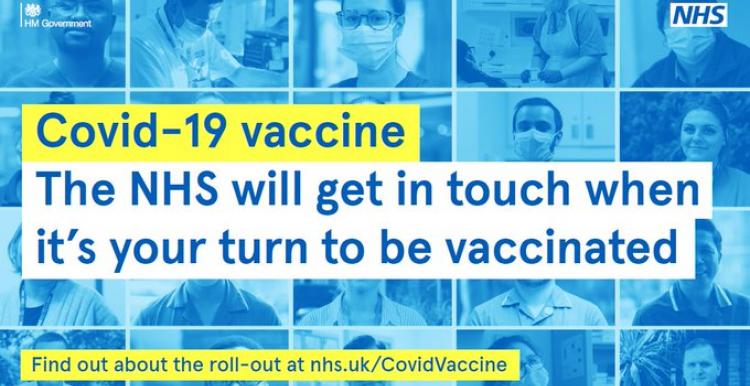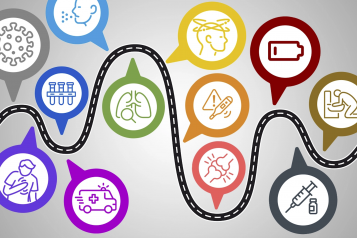What you need to know about the COVID-19 vaccines

The coronavirus (COVID-19) vaccines are safe and effective. They will give you the best protection against coronavirus. The vaccines are part of our defence – we need to continue with hands, face, space. The NHS will let you know when it is your turn to have a vaccine. It is important not to contact the NHS for a vaccination before then.
Q&A
Who will get it when?
The NHS is currently offering the COVID-19 vaccine to people most at risk from coronavirus.
In England, the vaccine is being offered in some hospitals and pharmacies, at hundreds of local vaccination centres run by GPs and at larger vaccination centres. More centres are opening all the time.
It's being given to:
- people aged 80 and over
- some people aged 70 and over
- some people who are clinically extremely vulnerable
- people who live or work in care homes
- health and social care workers
You also need to be registered with a GP surgery in England. You can register with a GP if you do not have one.
The Joint Committee for Vaccination and Immunisation (JCVI) published its detailed advice here.
How will I know when I can get a vaccine?
When it is the right time people will receive an invitation to come forward. For most people this will be a letter, either from their GP or the national NHS.
The NHS will let you know when it's your turn to have the vaccine. It's important not to contact the NHS for a vaccination before then.
Letters are being sent out every week – you might not get your letter straight away.
Where the jabs will be administered
In England, the vaccine is being offered in some hospitals and pharmacies, at hundreds of local vaccination centres run by GPs and at larger vaccination centres. More centres are opening all the time.
Over the coming weeks we will continue to build capacity across the system to offer more vaccinations with additional local vaccination services, hospital and vaccination centres coming on-line.
What vaccines are currently available?
Both the Pfizer/BioNTech and Oxford/AstraZeneca COVID-19 vaccines are now available. Both vaccines have been shown to be safe and offer high levels of protection and have been given regulatory approval by the MHRA.
The Government has in principle secured access to seven different vaccine candidates, across four different vaccine types, totalling over 357 million doses. This includes:
- 40 million doses of the BioNTech/Pfizer vaccine
- 100m doses of the Oxford/AstraZeneca vaccine.
- 7 million doses of the Moderna vaccine, which has been approved by the MHRA but is not expected to be delivered to the NHS until Spring.
Is the NHS confident the vaccines are safe?
Yes. The NHS will not offer any Covid-19 vaccinations to the public until independent experts have signed off that it is safe to do so.
The MHRA, the official UK regulator, have said that both of these vaccines have good safety profiles and offer a high level of protection, and we have full confidence in their expert judgement and processes.
As with any medicine, vaccines are highly regulated products.
There are checks at every stage in the development and manufacturing process, and continued monitoring once it has been authorised and is being used in the wider population.
Can I get one privately?
No. Vaccinations are only available through the NHS. You can be contacted by the NHS, your employer, or a GP surgery local to you, to receive your vaccine. Remember, the vaccine is free of charge.
- The NHS will never ask you for your bank account or card details.
- The NHS will never ask you for your PIN or banking password.
- The NHS will never arrive unannounced at your home to administer the vaccine.
- The NHS will never ask you to prove your identity by sending copies of personal documents such as your passport, driving licence, bills or pay slips.
If you receive a call you believe to be fraudulent, hang up. If you believe you have been the victim of fraud or identity theft you should report this directly to Action Fraud on 0300 123 2040. Where the victim is vulnerable, and particularly if you are worried that someone has or might come to your house, report it to the Police online or by calling 101.
How effective are the vaccines? How long do they take to work?
The 1st dose of the COVID-19 vaccine should give you good protection from coronavirus. But you need to have the 2 doses of the vaccine to give you longer lasting protection.
There is a chance you might still get or spread coronavirus even if you have the vaccine.
This means it is important to:
- continue to follow social distancing guidance
- if you can, wear something that covers your nose and mouth in places where it's hard to stay away from other people
Will the vaccines work with the new strains?
There is no evidence currently that the new strains will be resistant to the vaccines we have, so we are continuing to vaccinate people as normal. Scientists are looking now in detail at the characteristics of the virus in relation to the vaccines. Viruses, such as the winter flu virus, often branch into different strains but these small variations rarely render vaccines ineffective.
I am confused about my second dose of the vaccine? Can you explain it this to me?
Both vaccines have been authorised on the basis of two doses because the evidence from the clinical trials shows that this gives the maximum level of protection.
To ensure as many people are vaccinated as quickly as possible, the Department for Health and Social Care now advise that the second dose of both the
Oxford/AstraZeneca and the Pfizer/BioNtech vaccine should be scheduled up to 12 weeks apart.
The evidence doesn’t show any risk to not having the second dose other than not being as protected as you otherwise would be. We would urge everyone to show up for both of their appointments for their own protection as well as to ensure we don’t waste vaccines or the time of NHS staff.
What about the Moderna vaccine? Why is this available in the USA but not here?
The MHRA have now decided – after extensive assessment – that the Moderna vaccines are safe and effective. The Government provisionally ordered several million doses of this vaccine ahead of it being approved, but we don’t expect Moderna to be able to make these available until Spring 2021.
Can people pick what vaccine they want?
No. Any vaccines that the NHS will provide will have been approved because they pass the MHRA’s tests on safety and efficacy, so people should be assured that whatever vaccine they get, it is worth their while.
Will you use the Oxford vaccine more because it’s cheaper and easier to store?
The vaccines that the NHS uses and in what circumstances will be decided by the MHRA. Both vaccines are classed as being very effective. The Oxford/AstraZeneca is easier to store and transport, meaning we can deliver them in more places, and we expect to have more doses available as they are manufactured in the UK, so we would expect that most people are likely to receive this vaccine over the coming weeks and months.
Does the vaccine include any parts from foetal or animal origin?
No. There is no material of foetal or animal origin in either vaccine. All ingredients are published in healthcare information on the MHRA’s website. o For the Pfizer/BioNTech vaccine information is available here.
vaccine information is available here.
COVID-19 vaccine side effects
These are important details which the MHRA always consider when assessing candidate vaccines for use.
For these vaccines, like lots of others, they have identified that some people might feel slightly unwell, but they report that no significant side effects have been observed in the tens of thousands of people involved in trials.
All patients will be provided with information on the vaccine they have received, how to look out for any side effects, and what to do if they do occur, including reporting them to the MHRA.
More information on possible side effects can be found at
https://www.nhs.uk/conditions/coronavirus-covid-19/coronavirus-
vaccination/coronavirus-vaccine/
Is it mandatory?
There are no plans for a COVID-19 vaccine to be compulsory.
Why do I have to wait?
The COVID-19 vaccines will become available as they are approved for use and as each batch is manufactured. So every dose is needed to protect those at highest risk.
The NHS will let you know when it is your turn to have the vaccine.
Some people who are housebound or live in a care home and who can’t get to a local vaccination centre may have to wait for supply of the right type of vaccine. This is because only some vaccines can be transported to people’s homes.
Advice if you are of childbearing age, pregnant or breastfeeding
There's no evidence the COVID-19 vaccine is unsafe if you're pregnant. But more evidence is needed before you can be routinely offered the vaccine.
The JCVI has updated its advice to recommend you may be able to have the vaccine if you're pregnant and:
- at high risk of getting coronavirus because of where you work
- have a health condition that means you're at high risk of serious complications of coronavirus
You can have the COVID-19 vaccine if you're breastfeeding.
Speak to a healthcare professional before you have the vaccination. They will discuss the benefits and risks of the COVID-19 vaccine with you.
You do not need to avoid pregnancy after vaccination. The vaccine cannot give you or your baby COVID-19.
Read the latest COVID-19 vaccine advice if you're pregnant, may get pregnant or are breastfeeding on GOV.UK
How long will my vaccine be effective for?
We expect these vaccines to work for at least a year – if not longer. This will be constantly monitored.
What is being done to encourage vaccine uptake in black, Asian, minority ethnic and other disproportionately affected communities/groups?
We understand that some communities have specific concerns and may be more hesitant in taking the vaccine than others. The NHS is working collaboratively with partners to ensure vaccine messages reaches as diverse an audience as possible and are tailored to meet their needs. This includes engagement with community and faith-led groups, charities and other voluntary organisations.
What time will the opening hours of vaccination centres be?
Standard opening times for vaccination centres will be 8am – 8pm, seven days a week. To test the system and make sure the space is safe for visitors and staff, most vaccination centres in the first day or days may open slightly later.
COVID-19 vaccination: easy-read resources
Download easy-read guides providing information on coronavirus (COVID-19) and the vaccination.
Downloads
Useful updated leaflets provided by Public Health England for download

